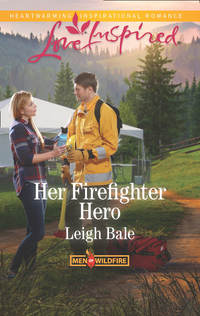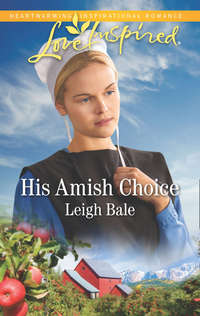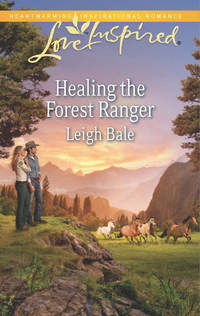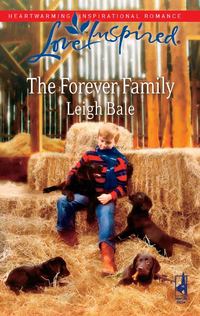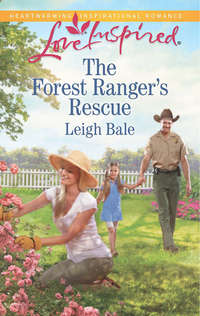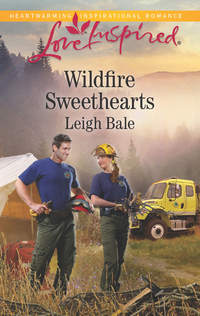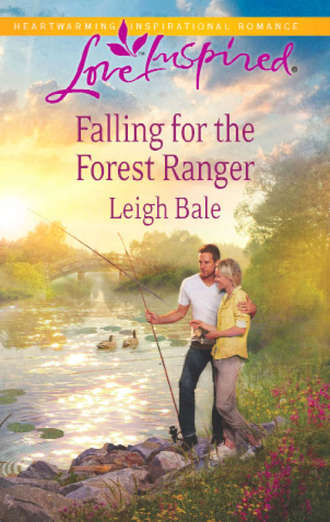
Полная версия
Falling for the Forest Ranger
“Occasionally.” He didn’t meet her eyes.
“What does that mean?” How could you occasionally believe in the Lord?
“God and I leave each other alone for the most part. It works better for us that way.”
She’d never heard such a cynical statement in all her life. She opened her mouth several times, a myriad of comebacks stinging her tongue. But then she remembered that she barely knew this man and had no right to judge him.
“You sound hurt,” she said.
“Uh-huh.” The firm set of his mouth told her he would say no more.
“Maybe we can go fishing after work,” Jonah said, seemingly oblivious to their discussion on Deity.
“We’re not going fishing today,” Zoë said.
“Then when can we go?” he persisted.
“We’ll talk about it later.” Zoë thought Jonah had said enough for one day.
“Is he always like this?” Tanner asked as they headed out of town.
She decided not to be offended by the question. From Tanner’s earnest expression, she didn’t believe he meant it as a criticism. “Yes, but he’s also an excellent student and gets along with everyone at school.”
“Except Brian. He bosses me around all the time. I don’t like him much.” Jonah made an ugly face.
Tanner chuckled and Zoë thought perhaps she’d misjudged the man. Maybe he wasn’t such a hard case after all.
Tanner’s fingers tightened around the steering wheel and he took a deep breath, as if he were about to submerge his head underwater. “Tell you what. I like to go fishing, too. How about I take you to Kids’ Creek Park in town? They have rainbow trout there and we just seeded the pond with hatchery-raised steelhead salmon. Since it’s illegal to catch steelhead in the wild, that’s a real treat. I’m sure we could catch your limit.”
“That’d be great.” Jonah bounced happily on the seat, then paused and quirked one brow. “But what does seeded mean?”
Tanner jerked his head toward Zoë. “Ask your mom.”
The boy promptly faced his mother and repeated his question.
She smiled and brushed a jagged thatch of blond hair away from his eyes. “It means they brought in a big truck from the fish hatchery filled with smaller steelhead fish and dumped them into the pond, just so kids like you can have fun catching them.”
“Except our steelhead aren’t small. Most of them are over twelve inches long,” Tanner said.
“Wow! Can we go, Mom? Can we?” Jonah wriggled with expectation.
She hesitated. Tanner’s invitation had come as a complete surprise. She sensed a subtle tensing in his shoulders and wondered if he regretted his offer. An outing of this sort was just what Jonah needed. She couldn’t think of one legitimate reason to say no. “Of course we can go.”
“Hooray!” Jonah swiveled around to face Tanner, his little body squirming in anticipation. “When? When can we go?”
“How about tomorrow afternoon?” Tanner smiled but stared straight ahead, keeping his eyes on the road.
“I’m afraid tomorrow is Sunday and I take Jonah to church. What about another day?” Zoë ignored Jonah’s irritated gasp. She was eager to worship God and meet their new congregation to make some friends. Then she could trade babysitting on the weekends and set up playdates for Jonah throughout the summer months.
Tanner swiped a hand across the light stubble on his chin. “I can’t go again until next Saturday.”
“That would work for us,” she agreed.
“But that’s a whole week away,” Jonah whined.
Zoë squeezed his arm gently to settle him down. “Then that’ll give you something fun to look forward to.”
“Ah,” he grumbled but didn’t argue further.
“Where are we going first?” Zoë asked Tanner, hoping to change the subject.
“Out to Harry Ragsdale’s farm.”
“It’s sure beautiful here.” Zoë gazed at Bingham River running parallel to the road, taking in the pristine view of clean, rushing water, willows and cottonwoods. Farther out, wide meadows covered with sedges and wire grass added a variety of vibrant green hues.
Tanner nodded in agreement, his expression showing pride in the area where he worked. Somehow sharing this appreciation with him gave them something in common.
They passed a sign that read Ragsdale Farms.
With their focus back on work, the frown returned to Tanner’s face. Just when Zoë thought they were making headway and becoming friends, Tanner had to go and disappoint her. She’d just have to remember not to expect anything from him—then she wouldn’t be disappointed again.
Chapter Four
The black asphalt gave way to dirt road. The tires of the truck kicked up gravel. Tanner slowed their speed and put on the blinker before turning onto Challis Road.
He must be crazy. What had he been thinking to invite Jonah on a fishing trip? He didn’t know a thing about kids. No doubt Zoë would come along. Which meant Tanner would have to be near her in a personal setting as well as at work.
No, he shouldn’t have made the offer. But remembering the fun he’d had with Grandpa had made him want the same for Jonah. He didn’t even like kids. Or at least he didn’t think he did. He’d wanted them once. Oodles of them. But his broken engagement had ended all that. Children were okay for other people, but not for him.
“There’s good riffle along the river here,” Zoë observed.
Tanner nodded and gazed at the frothing water dashing over the jagged rocks. Riffle oxygenated the spawning beds.
Zoë shielded her eyes against the bright sunlight pouring through the windshield. “How much of the water here is diverted for irrigation?”
Tanner couldn’t remember ever meeting a woman who was actually interested in his work. Zoë was quite refreshing. “All but 7 percent. This is a heavy agricultural area and they use almost all the water in the river.”
She gave a low whistle. “No wonder there isn’t enough for the fish to swim up the lower seven miles of the river.”
“We haven’t come up with an idea on how to combat that problem yet.”
“Do the farmers need to use all the water they take out for irrigation?”
He shrugged. “Probably not, but until we install farmer’s screens in all the irrigation ditches, there’s no system in place to control their outtake. Maybe you can think of something for us to do until we get all the screens in place.”
He’d kiss her if she came up with a solution. This one problem had become a real quandary for them. So far, nothing they’d tried had worked. He doubted that an outsider would be able to think of a solution.
Zoë pointed to an area along the riverbanks with no overhanging willows. “Have you had cattle grazing over there? The riverbanks are caved in and raw. No vegetation growing, which means no redds.”
Redds were spawning beds for fish. The eggs needed cold, clean, well-oxygenated water to survive. Without shade from overhanging willows and other vegetation, the temperature of the stream increased and killed off the eggs.
“Yes, the cows have tromped in the stream and broken down the banks here. We convinced several local ranchers to let us fence off parts of the streams to stop this from happening. The area should recover over time.”
Gazing out the window, he decided by midweek he could find a valid excuse to call Zoë and cancel the fishing trip with Jonah. There wasn’t enough time in his busy schedule to spend fishing with a cute little boy who talked too much anyway. Tanner had been foolish to make the offer.
No, he couldn’t do that. His guilty conscience nipped at him. Canceling would break Jonah’s heart. And Tanner wasn’t that cruel. Not yet anyway.
A kid like Jonah might be a lot of fun. And a lot of hard work, too. Tanner was gaining a new appreciation for Zoë. From his experience with his own mother, he knew that being a single mom wasn’t easy, yet Zoë seemed to do it with such calm grace.
He heaved a disgruntled sigh. Tanner hated the thought of hurting Jonah and losing the boy’s trust, though he didn’t know why. What Jonah Lawton thought shouldn’t matter to Tanner. The boy wasn’t his son. They had no connection except that Tanner now worked with Zoë. In spite of trying not to, Tanner still liked the kid.
Too much.
Maybe it was because Tanner understood the hurt of losing his father so young. Then, his mother had been busy working just to put food on the table. No quality time. No one to attend his ball games or help with his science projects. No one to confide his troubles and victories to.
Tanner shook his head, keeping his gaze on the narrow dirt road. They skirted fields of alfalfa, barley and potatoes, the outlying mountains providing a stunning backdrop for meadows and streams twining through the valley. Lovely and serene. Tanner frequently went to the mountains whenever he felt sad or lonely, which was often these days. Out here, he never felt lost or alone.
Until now. Until he’d met Zoë Lawton and her inquisitive little son. He wasn’t alone just now, but he still felt lost.
In a matter of days since he’d met them in Harper’s Grocery Store parking lot, something had changed for Tanner. Something he couldn’t explain. The fact that he didn’t know what it was left him feeling disconnected and troubled.
Yep, he’d have to go fishing with Jonah. He couldn’t retract the offer. Not without upsetting the boy, and his mother.
The mother.
He tossed a quick glance at Zoë, taking in her faded blue jeans, warm sweater and practical boots. Gone were the professional jacket, skirt and heels that’d almost made him salivate. With her slender legs crossed and her delicate hands resting in her lap, she looked too young to be a professional woman supporting a child.
And a widow.
From what Jonah had said, she’d lost her husband years ago. Tanner couldn’t help wondering if she’d loved the man. If his death had crushed her heart the way Cheryl had crushed his.
As the wheels thumped across the washboard road, he cast surreptitious glances Zoë’s way. Her head bobbed gently with the swaying of the vehicle. She looked completely at home, not at all a prissy city girl who couldn’t handle a bit of dirt on her clothes. Her smudged eyeliner made her blue eyes appear smoky and mysterious. No matter what this woman wore, she was beautiful.
As they passed the canal, Tanner slowed the truck and pointed at the trench filled with water. “You can see there’s no farmer’s screen on this irrigation ditch. Last spring, hundreds of fish took the wrong turn in the canal, got lost and ended up in the ditch instead of moving on their way through the river.”
Jonah sat up straighter to see out the window. “What happened to them?”
Surprised to find the child listening, Tanner explained, “With nowhere else to go, they ended up in the fields, dead.”
The boy blinked at that. “Dead?”
“Don’t worry, sweetheart, we’ll do something to stop it from happening again.” Zoë patted Jonah’s arm.
Tanner didn’t think she should promise something she might not be able to deliver. But her confidence made him feel as though they really could resolve the problems they faced.
They rounded the bend and saw a rusty old truck parked at the side of the road. A man in his mid-forties stood near the ditch bank, wearing a baseball cap, blue overalls and knee-high waders. He waved, then propped his shovel in the dirt before leaning his forearms against the top of the handle.
“That’s Harry Ragsdale.” Tanner pulled over, then killed the motor.
They all got out and joined Harry before Tanner made the introductions.
“I must admit I was a bit surprised when Tanner called to see if I’d meet with you today. What can I do for you?” Harry’s ruddy cheeks wobbled slightly as he shook Zoë’s hand.
“It’s not what you can do for us, but what we can do for you.” Zoë spoke right up, her voice pleasant enough. “We need to put a farmer’s irrigation screen on your property as soon as possible. We’d like your permission to start work immediately.”
Harry shrugged, his doubtful gaze resting heavily on Tanner. “I already told the ranger I can’t do that. Screens are a big pain to maintain. They catch garbage and clog up. They have to be constantly cleaned. I don’t have time for that kind of nonsense.”
Zoë’s spine stiffened, her smile fading to a disapproving frown. This didn’t look good.
“We have to do something, Mr. Ragsdale. The Endangered Species Act requires it by law,” she said.
Harry lifted a hand, as if to shoo away a fly. “Then do something else. But I’m not gonna put any screens on my property.”
Zoë tilted her head and her eyes hardened just a bit. “A screen will keep wayward salmon from swimming past the canal and ending up dead in your ditch.”
“I don’t care if they do. They rot and provide good fertilizer for my fields.”
Zoë’s mouth tightened. “But so many fish are dying that they’ve ended up on the endangered-species list. If you won’t maintain a screen, we’ll have to get an injunction against you to shut off your water.”
“What?” The word exploded from Harry’s mouth like a nuclear detonation. “You can’t do that. I need water for my crops. Shutting off my water would put me out of business.”
“You’re leaving us no other choice,” Zoë insisted.
Tanner held up both hands. This wasn’t what he’d expected at all. “Now, now, that won’t be necessary. We can deal with this situation without resorting to shutting off your water.”
Zoë glared at Tanner as if he’d just slapped her face. “Then, what do you recommend?”
“I can’t afford to install a farmer’s screen.” Harry’s voice vibrated with anger. “All that cement and steel. It’d cost me thousands of dollars.”
Jonah stepped closer to his mother, sliding his hand into hers as his eyes creased with worry over their raised voices. A protective impulse swarmed Tanner’s chest and he longed to comfort the child. Maybe he shouldn’t have agreed to bring the kid along. From the way Zoë patted the boy’s cheek in a reassuring gesture, she was having second thoughts, too.
“You won’t have to pay a dime of the costs, Harry. FRIMA has given us a grant to fund the project. We just need your permission to have it installed. We’ll do all the work.” Placing one hand on the other man’s shoulder, Tanner looked into his eyes, a tactic he frequently used to calm irate farmers.
“What’s FRIMA?” Harry asked in a gruff voice.
“The Fisheries Restoration and Irrigation Mitigation Act. They’re a voluntary, nonregulatory program that provides funding to screen water diversions. All you need to do is help ensure that it’s maintained. Can you do that if it means keeping the fish out of your ditches and moving in a safe passageway?”
“Well, um, yes, I suppose if you’re gonna pay for it, I can at least help maintain it,” Harry said.
“Good! I knew we could count on your help.” Tanner smiled, hoping to lighten the tense mood.
Zoë’s face flooded with color and Tanner could tell she was upset. Didn’t she realize that angering the local farmers would never help them achieve their goals? Threats would just get everyone fighting mad.
Harry smiled and nodded at Tanner but tossed a sneer at Zoë. And that’s when Tanner realized that she’d just made an enemy who would talk to the other farmers in the area. Word would soon spread like wildfire that they had a hard-nosed federal marine biologist in town. Tanner knew how it worked. He’d been at this game a long time now.
Tanner needed to talk to Zoë in private. He should have explained things better before he brought her out here. Letting her face an irate farmer hadn’t been Tanner’s intent, but he’d had no idea when Harry resisted their proposal that she’d make such a do-or-die threat.
“Okay, I’ll set it up and be in touch with you soon,” Tanner told Harry.
“Good, you do that. You can call me anytime,” Harry said.
As they walked back to Tanner’s truck, Zoë didn’t say a word. From her narrowed eyes, he realized this wasn’t over. She was very upset. At him. He could almost imagine hot steam jetting from her ears, eyes and nose. He figured she was keeping her silence because of Jonah. But once they were alone again, he dreaded the inevitable flare-up that was sure to follow.
* * *
Zoë bit down on the inside of her cheek to keep from telling Tanner what she really thought about the way he’d coddled Harry Ragsdale. No doubt he was doing the same kind of appeasement with the other farmers in the area. And what about the ranchers and logging companies?
Glancing at Jonah, she almost wished she hadn’t brought her son along. She was angry and burned to give Tanner a piece of her mind. But she didn’t want to have harsh words with Tanner in front of her little boy. For now, she clamped her mouth closed and thought of calm, professional words she should say to Tanner later on.
Tanner drove them out to meet with two more farmers, with the same results as the first. One farmer argued, even when Tanner told him that FRIMA would cover the expense. The farmer didn’t want the nuisance of dealing with a screen. He didn’t want to be bothered.
And then Zoë stepped in with her usual blunt candor, which triggered Tanner into cajoling the man to get him to agree. The way Tanner tried to accommodate each farmer made Zoë think Tanner was part of the problem rather than the solution. No wonder so many fish were dying!
By the time noon rolled around and Tanner parked his truck near a campground at the base of the Bingham Mountains, Zoë seethed with annoyance. She didn’t want to be so hard-nosed, but she had her orders. Her employment was riding on her success here. With a young son to raise, she couldn’t afford to lose her job.
While Jonah raced ahead to play by the stream that threaded its way through the tall cottonwoods, Zoë reached for her bag and their lunch. She then walked with Tanner toward a picnic table nearby.
“Jonah, don’t go too far. Stay where I can see you,” she called as the boy bent over the shallow creek and poked the water with a stick.
Tanner tugged the picnic basket from her hand and carried it for her. Finally they were alone and she could have a private word with him. Taking a deep breath, she vowed to remain civil.
“Who do you think you are?” she asked quietly.
Okay, that didn’t come out the way she’d intended. She was so troubled that her emotions seemed to burst out of her mouth.
His response sounded just as clipped, telling her that he was also flustered by today’s events. “I’m the Fisheries and Wildlife staff officer over this national forest. We want to get these people’s attention, but we also need their cooperation. And we can’t do that with threats. If we’re gonna solve these problems, we need the support of the farmers.”
Zoë wasn’t so sure that was true. And yet, she didn’t want to cause more problems, either. She felt like an astronaut in outer space, not quite sure of herself anymore. “They’ve already taken too much advantage, Tanner. These problems didn’t happen overnight. They happened over years and years of abuse. The fish are out of time. Coaxing and being nice will take too long. We need action right now.”
“And you think threats will work better?”
“When people refuse to do what’s right, yes. We have the law on our side.”
His dark eyes met hers. “Threats only work as a last resort,” he said. “But I’ve found that we can get a lot of cooperation from these people if we show them what the problem is and offer to help them solve it. If we fix problems by cramming solutions down their throats, we just end up with a bunch of congressional inquiries.”
She tilted her head in confusion, never quite taking her eyes off Jonah. “Congressional inquiries?”
He nodded. “That’s right. The farmers and ranchers have a direct line to their senators, whom they support with reelection funds. And believe me, their senators listen to everything they have to say.”
He chuckled without humor and she realized he was serious.
“But congressional inquiries?” she said again. “They really resort to such drastic measures?”
He hitched one shoulder. “Would you really resort to shutting off their water?”
She nibbled at the end of her pinkie finger, thinking this over. “Yes, I would.”
“Well, so would they. Before I came here, we had congressional inquiries all the time. The Steelhead National Forest doesn’t need politicians breathing down our necks. Which is what will happen if Harry Ragsdale and other farmers like him start making angry phone calls.”
No, that wouldn’t be good. It’d stir up a pot they didn’t want stirred and delay getting the job done even longer. Zoë never knew working at the local level could be so complicated.
“I can certainly understand why you want to avoid that,” she agreed.
But what about her orders? Her boss in Portland had made it very clear what he expected her to accomplish this summer. There wasn’t any room for pampering.
“So you can see why I tried to be pleasant with Harry Ragsdale instead of bullying him,” Tanner said.
“Did I bully him?” The thought made her feel horrible. She didn’t want to bully anyone. She was just trying to do her job.
His handsome mouth flashed with a brief smile, telling her that she’d surprised him today. “Yes, and you’re the prettiest bully I’ve come across lately.”
His words caught her off guard and her cheeks flushed with heat. From the sudden color in his face and the way he quickly looked away, she could tell he’d let the compliment slip out without thinking.
Okay, better to forget about his flattering remark. She’d just let it drop.
“I’m sorry I didn’t warn you before we came out here. I should have explained the situation to you better,” he said.
She appreciated his apology, but it didn’t solve anything right now. “Then what do you propose? If farmers won’t agree to let us install the screens on their property, then we’ll need to force them to comply.”
He snorted. “Good luck with that tactic.”
Zoë couldn’t help feeling bitter about the situation. From what she’d seen, most people didn’t care. They just wanted to go on with their lives, without any inconvenience to themselves. And Tanner seemed to be letting them do it. “I just don’t like the way you baby them.”
“I’m not babying them. I’m working to get results we can all live with.” He set the basket on the picnic table.
Biting her tongue, Zoë spread out a thin cloth, then unpacked their lunch. She kept her face toward the stream, watching Jonah.
Tanner stood at the edge of the table, hands in his pockets. Zoë quashed the urge to apologize. Not when she really believed he was wrong in his tactics. And frankly, she had the power to override him. She didn’t want to do that and cause more friction between them, but she’d do it if she had to.
“At least we got them each to agree to the screens,” he said lamely.
She handed him a paper plate with a turkey-and-Swiss-cheese sandwich and a handful of grapes and rippled potato chips on the side. “Three down and zillions more to go.”
His frosty gaze brushed past hers in a dismissive glance. “We’ll deal with each of them.”
“Hey, I saw little fish swimming in the stream,” Jonah gasped as he joined them. “But they don’t have any fins. Just a long tail.”
He plopped down on the bench and snatched up a sandwich, seemingly oblivious to the dark stares from the adults nearby.
“That’s nice, sweetheart. But I’ll bet they’re tadpoles, not fish,” Zoë said.
“Tadpoles?” Jonah’s brow crinkled as he took a bite and chewed.
“Baby frogs. You saw them once in Portland, remember? And we need to bless the food before we eat it.” She answered patiently, surprised at her serene voice when she was feeling anything but calm inside. Why could she maintain her composure with Jonah but not with Tanner?
Conscious of Tanner’s troubled frown resting on her, she offered a quick prayer. She and Tanner ate their lunches in silence, listening to Jonah’s happy chatter. She answered the child’s melee of questions about tadpoles with quick, succinct sentences. Only when Zoë brought out the cookies did Tanner speak to her again.


